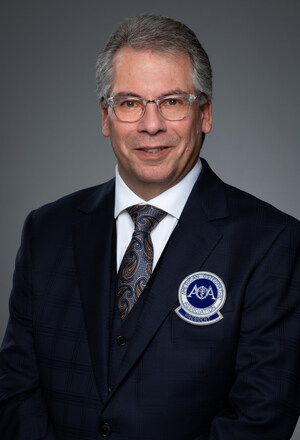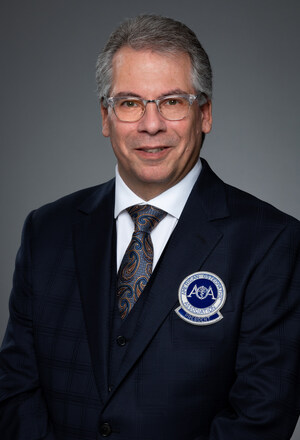
Up to 5% of Adults Have Attention-Deficit/Hyperactivity Disorder, Finds JAOA – The Journal of the American Osteopathic Association Clinical Review
CHICAGO, Nov. 21, 2011 /PRNewswire-USNewswire/ -- Often thought of as a childhood affliction, more than 50% of children with attention-deficit/hyperactivity disorder (ADHD) will carry the disorder over into adulthood, according to a review of adult ADHD studies that appeared in a recent issue of JAOA – The Journal of the American Osteopathic Association. The initial lack of recognition that an adult form of ADHD exists can be attributed to the fact that many of the presenting symptoms seen in children tend to morph over time, according to the clinical review's authors.
"Adults with ADHD are not likely to run around erratically in social settings as you might see with a younger ADHD patient," says co-author David A. Baron, DO, an AOA board-certified psychiatrist. "Instead, that person might feel restless and have a difficult time sitting still and maintaining focus."
What is ADHD?
ADHD is characterized by core symptoms, including:
- Inattention
- Hyperactivity
- Distractibility
- Impulsivity
It is estimated that 2% to 5% of the adult population in the United States has ADHD. Adults with ADHD are at an increased risk for experiencing psychiatric disorders, including mood disorders, anxiety disorders and substance abuse disorders. Adults with ADHD often have trouble organizing their lives, meeting deadlines and attending to boring tasks. Other challenges include poor memory, poor concentration skills and being impulsive.
"People just think, 'It's just who I am and always have been,'" says Dr. Baron, a professor and vice chairman of the department of psychiatry at the Keck School of Medicine of the University of Southern California in Los Angeles. "The continuous nature of ADHD symptoms from childhood coupled with the lack of knowledge that an adult form of ADHD exists may explain why most adults do not receive a diagnosis or treatment for this disorder."
How is ADHD diagnosed?
Although a number of screening techniques and psychological testing can help a physician make a diagnosis, Dr. Baron says an accurate diagnosis is dependent upon a comprehensive interview with the patient by a health care provider who is knowledgeable about ADHD.
Besides the core symptoms, Dr. Baron says it is also important to look at executive functioning, which entail a person's cognitive skills. The core executive functioning deficits in adults with ADHD are rated on a scale in the following areas:
- Activation of activity, including organizing, prioritizing and beginning tasks
- Focus
- Effort
- Emotion
- Memory
"Adults with untreated ADHD tend to suffer from other mental health issues compared to adults without ADHD," Dr. Baron says. "They also face lower education levels, poorer employment records and higher rates of divorce or failed relationships. Many of these adverse life outcomes are directly related to difficulties with executive functioning."
Treatment options
A combination of medication and behavioral therapy, particularly cognitive therapy, can be used to help treat ADHD. Neurofeedback, which involves placing sensors on the scalp to measure brain activity, may be effective in treating both children and adults, Dr. Baron says. He adds that some people report seeking help from life coaches who are specifically trained to assist adults with ADHD.
"Appropriate treatment can help improve a person's marriage, job and overall self-esteem and life functioning," Dr. Baron says.
According to the clinical review, a Google search of the term treatment of adult ADHD yielded more than 3 million results. Dr. Baron stresses the importance of people speaking with their physician if they suspect they have adult ADHD rather than relying on information they find online that might not be accurate or be the best treatment option.
"The Internet does allow easy access to credible, evidence-based information about health care topics, like adult ADHD. However, not all content has been reviewed by medical professionals, making it difficult for people to distinguish between genuine science and personal opinions," says Dr. Baron. "That is why it is important for people to ask their physicians questions about ADHD or any other health conditions to ensure they are getting accurate information."
About the clinical review
Authors David A. Baron, DO; Michele T. Pato, MD; and Rebecca L. Cyr, BA; provide a brief clinical overview of attention-deficit/hyperactivity disorder (ADHD) and the treatment of adults with this disorder. Recent epidemiologic studies report up to 5% of the adult population in the United States may have ADHD. A total of 31 original studies were identified and selected for this review.
About JAOA—The Journal of the American Osteopathic Association
JAOA—The Journal of the American Osteopathic Association is a monthly peer-reviewed scientific publication produced by the American Osteopathic Association (AOA). The AOA proudly represents its professional family of more than 78,000 osteopathic physicians (DOs); promotes public health; encourages scientific research; serves as the primary certifying body for DOs; is the accrediting agency for osteopathic medical schools; and has federal authority to accredit hospitals and other health care facilities. More information on DOs/osteopathic medicine can be found at www.osteopathic.org.
Twitter: @AOAforMedia
SOURCE American Osteopathic Association







Share this article